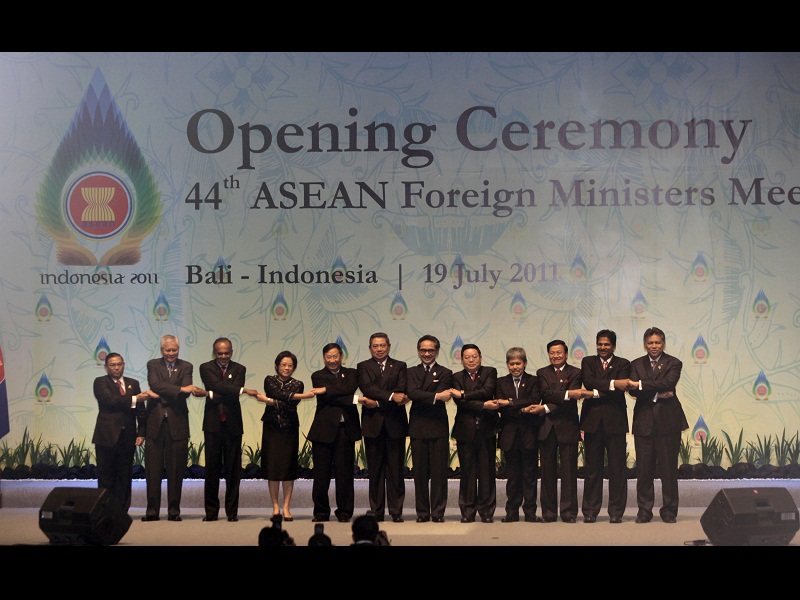Asian ministers discuss West Philippine Sea, security

Foreign Ministers and delegate from the 10-member Asean hold hands during the opening ceremony of the Asean Ministerial meeting in Nusa Dua, Bali, Indonesia, Tuesday. AP
BALI, Indonesia—Territorial disputes and flare-ups in the West Philippine Sea (South China Sea) were expected to take center stage at Asia’s largest security forum this week, with Vietnam and the Philippines accusing China of interfering in their energy exploration efforts.
Foreign ministers from the 10-member Association of Southeast Asian Nations arrived Tuesday at a tightly guarded five-star hotel on Indonesia’s resort island of Bali for their annual get-together. They will be joined later in the week by officials from Asia-Pacific, Europe and the United States for the Asean Regional Forum.
President Susilo Bambang Yudhoyono said in his opening statement that goals of the Southeast Asian bloc include establishing a European-style economic community by 2015 and fighting threats like climate change and human trafficking.
But the North Korean nuclear crisis also will be high on the table—with representatives from the stalled six-party talks aimed at convincing Pyongyang to give up its weapons program all in attendance.
Members also are growing frustrated by the slow pace of democratic reforms in military-dominated Myanmar and want to end once and for all a border dispute between Cambodia and Thailand.
Overshadowing talks, however, will be China’s increasingly assertive stance in the potentially resource-rich South China Sea, officials said on the sidelines Tuesday.
The sparring is primarily over the Spratlys, nearby Paracels and Scarborough Shoal, a slew of tiny, mostly uninhabited islands, some no more than a half-submerged coral reef and surrounding waters.
China claims the entire area, a large swath extending far from its southern coast and overlapping with the 230-mile (370-kilometer) exclusive economic zones of the Philippines and Vietnam and, to a lesser degree, of Malaysia, Brunei and Taiwan.
The smaller Southeast Asian nations often look for backing from the US, which is eager to protect strategic shipping lanes in the waters and deepen its own military ties in the region. That only serves to further irk China.
Vietnam says on two occasions since May, China cut cables used by its ships to conduct seismic tests on the sea floor, something Beijing denies.
And last week, just as it looked like temperatures were starting to cool, a Vietnamese border official alleged that a fishing boat was chased and attacked by Chinese soldiers near the Paracel islands.
The Vietnamese boat captain was beaten but not seriously injured, according to the official, but it was enough to send protesters to the streets in Hanoi with signs that said “Stop murdering Vietnamese fishermen.”
In March, the Philippines said, two Chinese naval ships threatened one of their ships exploring for gas in an area known as Red Bank. China would only admit that incidents took place in its waters.
“We need to see some progress on the South China Sea,” said Yudhoyono before retreating behind closed doors, saying efforts to implement code-of-conduct guidelines in the disputed waters were long overdue.
“We need to send a strong signal to the world that the future of the South China Sea is a predictable, manageable and optimistic one,” he said.
Asean, founded in 1967, groups Brunei, Cambodia, Indonesia, Laos, Malaysia, Myanmar, the Philippines, Singapore, Thailand and Vietnam. It admitted Myanmar in 1997, despite strong opposition from Western nations.
For comprehensive coverage, in-depth analysis, visit our special page for West Philippine Sea updates. Stay informed with articles, videos, and expert opinions.